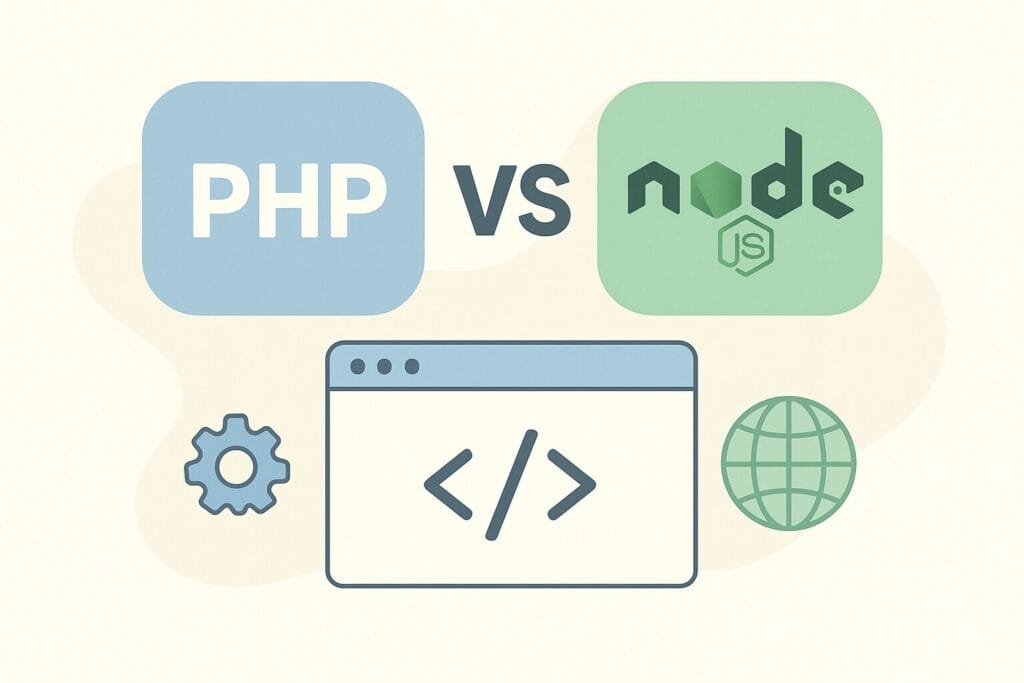When it comes to choosing the right backend technology for web development, PHP and Node.js are two of the most popular choices among developers. Both technologies have evolved significantly and offer unique advantages. This article provides an in-depth comparison between PHP and Node.js to help you decide which one fits your project best.

1. Overview of PHP
PHP (Hypertext Preprocessor) is a widely-used open-source scripting language designed for web development and can be embedded into HTML. Since its creation in 1994 by Rasmus Lerdorf, PHP has powered millions of websites, including WordPress, Wikipedia, and Facebook (in its early stages). PHP is mainly used for server-side development and runs on almost any server platform such as Apache or Nginx.
2. Overview of Node.js
Node.js is a runtime environment built on Chrome’s V8 JavaScript engine, introduced in 2009 by Ryan Dahl. It allows developers to use JavaScript for server-side development, enabling full-stack programming with a single language. Node.js is event-driven and non-blocking, making it perfect for building scalable and high-performance web applications.
3. Core Differences Between PHP and Node.js
Although both technologies serve similar purposes, they differ significantly in performance, scalability, ecosystem, and syntax. The table below summarizes the main differences:
| Feature | PHP | Node.js |
|---|---|---|
| Language Base | PHP scripting language | JavaScript runtime environment |
| Performance | Slower due to synchronous processing | Faster due to non-blocking, event-driven model |
| Concurrency | Multi-threaded | Single-threaded with event loop |
| Learning Curve | Easy for beginners | Requires good understanding of JavaScript |
| Database Support | Best with MySQL, MariaDB, PostgreSQL | Great with NoSQL (MongoDB) and SQL databases |
| Hosting | Widely supported by shared hosting | Requires VPS or cloud hosting |
| Frameworks | Laravel, CodeIgniter, Symfony | Express.js, NestJS, Koa |
| Community | Huge and mature community | Growing and active open-source community |
4. Performance Comparison
One of the most noticeable differences between PHP and Node.js is their performance. Node.js uses an event-driven, non-blocking I/O model, which makes it highly efficient for handling multiple concurrent requests. This makes Node.js ideal for real-time applications such as chat systems or online gaming.
PHP, on the other hand, executes synchronously and processes each request separately. While modern frameworks like Laravel and PHP 8 improvements have significantly enhanced performance, Node.js generally offers faster response times in large-scale or I/O-heavy applications.
5. Scalability and Flexibility
Scalability is another factor to consider. Node.js excels in building scalable applications due to its asynchronous architecture. Developers can easily create microservices and distribute tasks efficiently across multiple servers.
PHP, although not inherently asynchronous, can also handle scaling with tools like NGINX load balancing and PHP-FPM. However, Node.js is generally preferred for projects that require real-time data updates or high scalability needs.
6. Ecosystem and Libraries
Both technologies boast large ecosystems. PHP’s Composer serves as its package manager, providing thousands of reusable packages. Node.js uses npm (Node Package Manager), which is one of the largest ecosystems in the world, containing millions of libraries that can speed up development.
For instance, if you’re building a RESTful API, Node.js with Express.js can get you started quickly, while PHP with Laravel offers elegant syntax and a robust MVC structure.
7. Learning Curve and Developer Experience
PHP has long been known as a beginner-friendly language for web development. Its integration with HTML and the simplicity of syntax make it easy for newcomers to learn. Node.js, however, requires a solid understanding of JavaScript, asynchronous programming, and callback functions, which can be challenging for some developers.
8. Use Cases
- PHP: Ideal for CMS-based websites (WordPress, Drupal), e-commerce platforms, and traditional web applications.
- Node.js: Best suited for real-time applications like chat apps, streaming services, and APIs that handle a high volume of simultaneous connections.
9. Hosting and Deployment
PHP hosting is affordable and widely available, even on shared hosting platforms. In contrast, Node.js typically requires more advanced setups like VPS or cloud-based environments. However, services such as Vercel or Heroku have simplified Node.js deployment considerably.
10. Which One Should You Choose?
The decision between PHP and Node.js depends on your project type and development goals:
- If your project involves a content management system or traditional website, PHP with Laravel or WordPress is a reliable and cost-effective choice.
- If your application needs real-time updates, RESTful APIs, or scalable microservices, Node.js is the better option.
11. Final Thoughts
In the end, there’s no absolute winner in the PHP vs Node.js debate. Each technology shines in its domain. The right choice depends on your team’s expertise, the nature of your project, and performance requirements. Understanding the strengths and weaknesses of both will help you make an informed decision for your next web development project.
Conclusion
Both PHP and Node.js have proven themselves as powerful backend technologies. While PHP continues to dominate the web with content-heavy sites, Node.js is paving the way for modern, high-performance web applications. The best way forward is to analyze your project needs, budget, and scalability requirements before making your choice.
Which one do you prefer — PHP or Node.js? Share your experience in the comments below!

